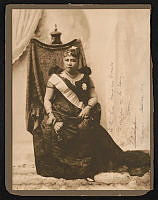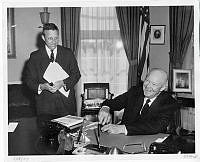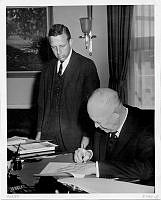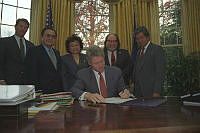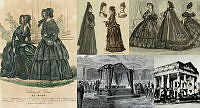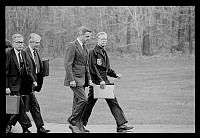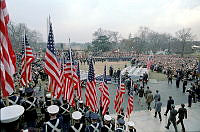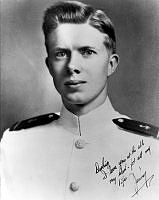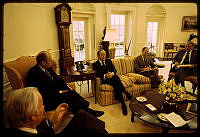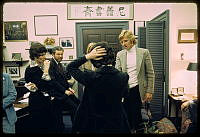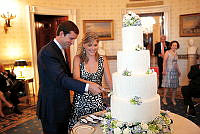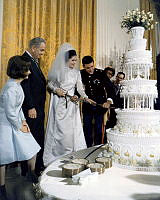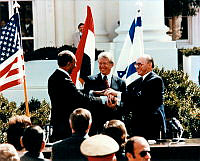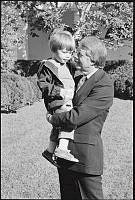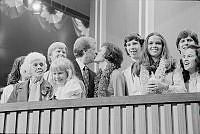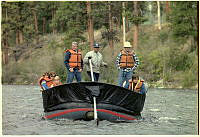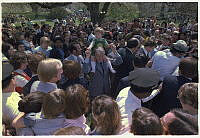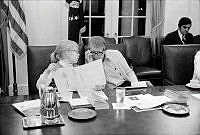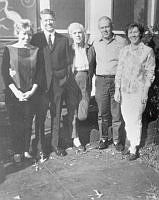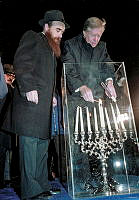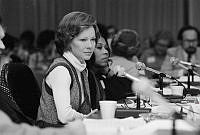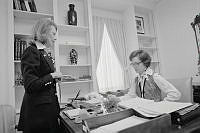George W. Bush

George W. Bush became the second presidential son (after John Quincy Adams) to assume office. Although initially focused on tax cuts and education reform, Bush's two terms became defined by the September 11, 2001 terrorist attacks.
Bush was born in New Haven, Connecticut, on July 6, 1946 where his father was attending Yale. When George H.W. Bush entered the oil business, the family moved to Midland, Texas. George followed in his father's footsteps, attending prep school at the Phillips Academy and graduating from Yale in 1968. He served in the Texas Air National Guard, went to Harvard Business School, and then returned to Midland, where he entered the oil industry. In 1977 he married Laura Welch, a teacher and librarian, who, in 1982, gave birth to twins Jenna and Barbara. In 1978, Bush was defeated in a campaign for the U.S. House of Representatives.
In the 1980s, Bush worked to gain a foothold in a flagging Texas oil economy while serving as adviser during his father’s vice presidency and presidential campaigns. On his 40th birthday, he gave up drinking alcohol and grew more serious about his Christian faith. He became managing partner of the Texas Rangers while keeping his eye on political opportunities in his home state.
In 1994, Bush defeated incumbent Ann Richards to become governor of Texas. Extolling "compassionate conservatism," he won the 2000 Republican presidential nomination. The general election result hinged on the state of Florida. Due to the closeness of the vote, a recount was conducted and was contested in federal court. In a controversial decision, the Supreme Court ordered Florida to stop a subsequent recount of the ballots. Bush won the Electoral College with 271 votes, although lost the popular vote to his opponent, Vice President Al Gore.
On September 11, 2001, almost three thousand people were killed in an attack by the terrorist group Al-Qaeda on New York’s World Trade Center and the Pentagon. Also, a hijacked commercial airplane headed for the United States Capitol was overtaken by passengers and crashed in Shanksville, Pennsylvania. Bush declared a worldwide “war on terrorism,” took the nation into battle against the Taliban regime in Afghanistan, and waged war against the Iraqi dictatorship of Saddam Hussein.
Bush's campaign for reelection in 2004 was jeopardized by the Iraq War's growing unpopularity and its connection to the larger global war on terror. But after a close race, Bush defeated Massachusetts Senator John Kerry.
Bush’s second term proved full of trial. He was criticized for being too slow to aid victims of Hurricane Katrina, which struck New Orleans and the Gulf Coast. Others complained that while pursuing terrorists, Bush had been too insensitive to civil liberties and American values. In 2007, the United States entered a deep recession, caused by a subprime mortgage crisis and slowed growth. After Congress failed to pass a bill to provide support to banks, the stock market crashed on September 29, 2008, with the Dow Jones falling 777 points in one day.
When Bush returned to Texas, he insisted that his presidency had been a “joyful” experience. He noted that he had kept the nation safe from terrorism after 2001 and maintained that “the true history of my administration will be written fifty years from now.”







